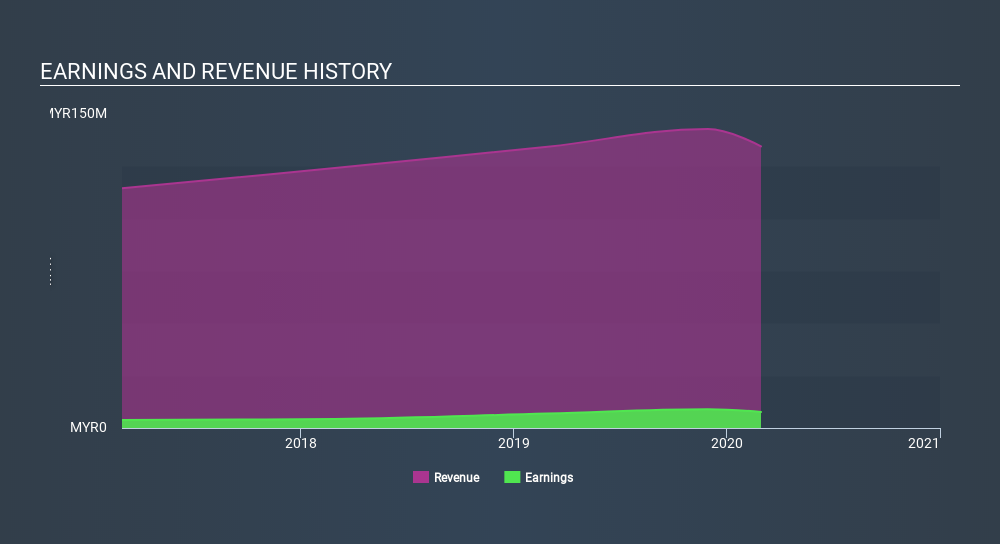- Malaysia
- /
- Trade Distributors
- /
- KLSE:ACO
ACO Group Berhad (KLSE:ACO) Is Growing Earnings But Are They A Good Guide?
Statistically speaking, it is less risky to invest in profitable companies than in unprofitable ones. Having said that, sometimes statutory profit levels are not a good guide to ongoing profitability, because some short term one-off factor has impacted profit levels. In this article, we'll look at how useful this year's statutory profit is, when analysing ACO Group Berhad (KLSE:ACO).
While ACO Group Berhad was able to generate revenue of RM134.5m in the last twelve months, we think its profit result of RM7.67m was more important. In the chart below, you can see that its profit and revenue have both grown over the last three years.
View our latest analysis for ACO Group Berhad

Importantly, statutory profits are not always the best tool for understanding a company's true earnings power, so it's well worth examining profits in a little more detail. As a result, we think it's well worth considering what ACO Group Berhad's cashflow (when compared to its earnings) can tell us about the nature of its statutory profit. That might leave you wondering what analysts are forecasting in terms of future profitability. Luckily, you can click here to see an interactive graph depicting future profitability, based on their estimates.
Zooming In On ACO Group Berhad's Earnings
As finance nerds would already know, the accrual ratio from cashflow is a key measure for assessing how well a company's free cash flow (FCF) matches its profit. The accrual ratio subtracts the FCF from the profit for a given period, and divides the result by the average operating assets of the company over that time. The ratio shows us how much a company's profit exceeds its FCF.
That means a negative accrual ratio is a good thing, because it shows that the company is bringing in more free cash flow than its profit would suggest. That is not intended to imply we should worry about a positive accrual ratio, but it's worth noting where the accrual ratio is rather high. Notably, there is some academic evidence that suggests that a high accrual ratio is a bad sign for near-term profits, generally speaking.
ACO Group Berhad has an accrual ratio of 0.22 for the year to February 2020. Therefore, we know that it's free cashflow was significantly lower than its statutory profit, which is hardly a good thing. Over the last year it actually had negative free cash flow of RM5.6m, in contrast to the aforementioned profit of RM7.67m. We saw that FCF was RM1.3m a year ago though, so ACO Group Berhad has at least been able to generate positive FCF in the past.
Our Take On ACO Group Berhad's Profit Performance
ACO Group Berhad's accrual ratio for the last twelve months signifies cash conversion is less than ideal, which is a negative when it comes to our view of its earnings. Therefore, it seems possible to us that ACO Group Berhad's true underlying earnings power is actually less than its statutory profit. In further bad news, its earnings per share decreased in the last year. At the end of the day, it's essential to consider more than just the factors above, if you want to understand the company properly. If you want to do dive deeper into ACO Group Berhad, you'd also look into what risks it is currently facing. Case in point: We've spotted 4 warning signs for ACO Group Berhad you should be mindful of and 2 of these can't be ignored.
This note has only looked at a single factor that sheds light on the nature of ACO Group Berhad's profit. But there is always more to discover if you are capable of focussing your mind on minutiae. Some people consider a high return on equity to be a good sign of a quality business. So you may wish to see this free collection of companies boasting high return on equity, or this list of stocks that insiders are buying.
Love or hate this article? Concerned about the content? Get in touch with us directly. Alternatively, email editorial-team@simplywallst.com.
This article by Simply Wall St is general in nature. It does not constitute a recommendation to buy or sell any stock, and does not take account of your objectives, or your financial situation. We aim to bring you long-term focused analysis driven by fundamental data. Note that our analysis may not factor in the latest price-sensitive company announcements or qualitative material. Simply Wall St has no position in any stocks mentioned. Thank you for reading.
About KLSE:ACO
ACO Group Berhad
An investment holding company, distributes electrical products and accessories for industrial, commercial, and residential use primarily in Malaysia.
Excellent balance sheet with proven track record.
Similar Companies
Market Insights
Community Narratives





